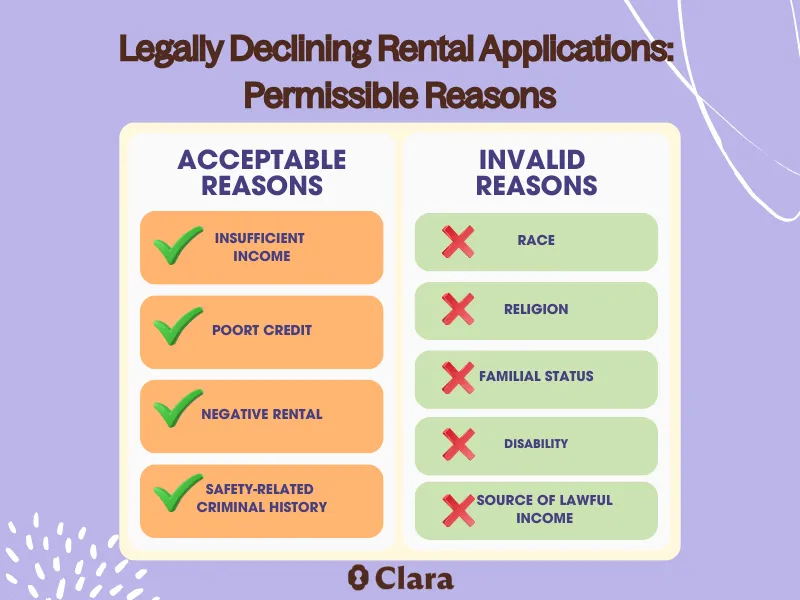
Did you know that nearly 1 in 5 landlords face legal issues when declining a rental application?

This shows how important it is to know the legal side of tenant screening.
As a landlord, knowing the risks of saying no to a rental application is key. Following fair housing laws and having clear tenant screening rules can lower these risks.
By getting the legal side and using best practices, landlords can make smart choices when looking at rental applications.
"The rental industry often views fair housing compliance as a defensive practice—a shield against legal action—but this misses the transformative opportunity it presents. When we embrace fair housing principles as a foundation rather than a constraint, we create spaces where trust flourishes naturally between property managers and residents. Consistent, transparent screening criteria don't just protect you legally; they build community confidence by signaling that your decisions are based on legitimate business needs rather than unconscious biases. In today's rental landscape, the most successful property managers understand that compliance and compassion aren't competing priorities—they're complementary strategies that create sustainable, thriving communities."
Taylor Wilson, CEO of Rent with Clara

As a landlord, knowing fair housing laws is key. It helps you make lawful decisions on rental applications. These laws aim to stop discrimination and ensure equal housing opportunities.
The Fair Housing Act (FHA) is a federal law. It stops discrimination in housing sales, rentals, and financing. The U.S. Department of Housing and Urban Development (HUD) enforces it.
The FHA protects certain groups from discrimination:
Landlords must not discriminate against applicants based on these traits.
Many states and local areas have their own fair housing laws. These laws might add more protected classes or have specific rules for landlords.
For instance, some states protect against discrimination based on:
Breaking fair housing laws can lead to big legal troubles. This includes fines and lawsuits. HUD and other agencies check for housing discrimination complaints.
Following fair housing laws is more than avoiding legal trouble. It's about making your rental place fair and welcoming. By learning these laws, you can make sure your rental practices are fair and respectful to all applicants.

Declining rental applications needs careful thought about fair housing laws. Landlords must have lawful reasons and be ready to justify them if asked.
Landlords often say no because of insufficient income. It's key that a tenant can pay the rent on time. They check if the applicant's income is at least three times the monthly rent.
This rule helps avoid late payments or not paying at all.
A poor credit history or low credit score is a valid reason. Credit reports show if someone can handle money well. Scores under 600 might mean they could default on rent.
A comprehensive tenant screening report provides valuable insights beyond just credit scores, helping landlords make informed rental decisions based on legitimate business reasons. When reviewing credit reports during your tenant selection process, focus on patterns that indicate financial responsibility rather than isolated incidents.
Look for consistent payment history, current debt-to-income ratios, and any recent improvements in credit management that demonstrate the applicant's commitment to meeting financial obligations under a lease or rental agreement.
However, landlords must be careful not to reject an applicant based solely on credit report information without considering the full context. If you decide to deny an application due to credit issues, you must provide specific details about which aspects of the credit report influenced your decision.
This transparency helps protect your rental business from discrimination claims while ensuring your tenant screening process remains both thorough and legally compliant.
Negative rental history is another reason. This includes evictions, late payments, or damage. Landlords check with past landlords to see if there were problems.
Bad references can warn of future issues with reliability or behavior.
Looking at an applicant's criminal background is tricky. Having a record doesn't mean you can't rent. But, some crimes might be a problem. Landlords must follow their policies and know about discrimination laws.
For more on why you can say no, including about criminal history, check 15 Legal Reasons to Deny
When a tenant has been convicted of a crime, landlords face complex legal requirements that go beyond simple blanket policies. You cannot deny all applicants with criminal histories, as this may constitute discriminatory practices under fair housing guidelines.
Instead, you must evaluate each tenant's application individually, considering factors such as the nature and severity of the offense, how much time has passed since the conviction, and evidence of rehabilitation or changed circumstances.
Common reasons that might justify denying based on criminal history include recent convictions for violent crimes, drug-related offenses that occurred on rental properties, or crimes that directly relate to property damage or tenant safety. However, you must apply these rental criteria consistently and be prepared to demonstrate that your decision was based on legitimate business reasons rather than assumptions.
If the tenant does not agree with your assessment, they may request additional documentation or character references to support moving forward with their application.
Understanding what constitutes illegal reasons to deny a rental application is just as crucial as knowing valid reasons to deny situations. Landlords cannot reject a tenant based on protected characteristics such as race, religion, familial status, or disability, even if they believe these factors might affect the tenant's ability to pay rent on time.
Additionally, you cannot deny an applicant simply because they have children, are pregnant, or require reasonable accommodations for disabilities in your rental unit.
Other illegal reasons include retaliating against prospective tenants who have previously filed complaints about housing discrimination, or refusing applications based on the applicant's source of lawful income, such as Social Security or housing assistance programs.
Some landlords mistakenly believe they have the right to deny their application based on personal preferences like lifestyle choices, political affiliations, or assumptions about an applicant's ability to maintain the property. However, these reasons to deny a rental can expose your rental business to significant potential legal consequences and discrimination lawsuits.
To avoid legal trouble and follow fair housing laws, landlords need to have the same rules for all tenants. They should write down a clear policy for checking potential renters.
A strong written screening policy is key for fair tenant checks. This policy should list the rules for checking applicants, like their credit score, income, and past rentals.
When making your policy, think about these points:
Having minimum requirements makes sure all applicants are treated the same. These rules should be in your policy and followed for every applicant.
Some examples of these requirements are:
It's important to apply your screening rules the same way to everyone. This helps avoid legal problems.
To do this, landlords should:
Fair housing laws can change, so landlords need to regularly review and update their screening rules. This keeps them in line with the law and reduces legal risks.
Landlords should:
By having the same rules for all tenants, landlords can avoid legal problems. They also make sure the rental application process is fair and clear.
Keeping accurate records is key to a smooth rental application process. It ensures landlords follow fair housing laws and provides a clear trail for audits or disputes.
It's vital to keep detailed records on each applicant. This includes their rental history, credit reports, and job verification. Accurate record-keeping helps landlords make fair decisions.
Landlords should use a standard application form.
This form should ask for:
When saying no to an applicant, it's crucial to document the reasons well. This protects landlords from unfair claims. The reasons should clearly state why the applicant didn't meet the criteria.
For example, if credit is the issue, the documentation should include:
Landlords must follow record retention requirements, which differ by area. Keeping records for at least three years is common. This ensures landlords can provide needed documents during audits or complaints.
It's also crucial to store these records safely. Use encrypted digital storage or locked cabinets to keep applicant info private.
Property management software makes keeping records easier and boosts compliance.
These tools offer:
Using such software helps landlords manage compliance better. It also lowers the chance of mistakes in their records.
A well-structured denial letter is key to following fair housing laws when rejecting rental applicants. This important document tells the applicant why they were denied. It also keeps a clear record of the reasons, which helps avoid legal problems.
A legally compliant rental application denial letter must have several key parts. These parts ensure clarity and follow the law.
They include:
For a detailed guide on writing denial letters, check out Doorloop's rental application denial letter resource.
Using a template makes writing a denial letter easier and ensures legal standards are met.
Here's a basic structure:
When to notify applicants of the decision is very important. Landlords and property managers should tell applicants within a few days. The exact time may depend on local or state laws, so it's crucial to know these rules.
Denial letters should be sent in a way that proves they were received. This can be certified mail or email with read receipts. This step is key to showing the applicant got the letter, which can be important if there's a dispute.
By following these guidelines and using available resources, landlords and property managers can make sure their denial letters are legally correct. This helps avoid disputes and legal problems.
Dealing with disputes and inquiries from applicants is key to a fair rental process. Landlords must handle concerns professionally and quickly.
When an applicant asks why they were denied, landlords should give a clear answer. They should explain the reasons based on the screening process. It's important to mention the criteria used.
For example, if credit was the issue, explain how it impacted the decision. Being open helps applicants understand the denial.
Landlords need to be ready for discrimination claims from denied applicants. Keeping detailed records of the screening process is crucial. This shows they follow fair housing laws.
If an applicant claims discrimination, landlords should:
Landlords should talk to a lawyer in certain situations:
Legal advice helps navigate these issues and ensures compliance with laws.
Allowing applicants to discuss their denial can help solve disputes peacefully. This might mean considering new information not seen before.
For instance, if credit was the issue, new evidence could change the decision. Landlords can then re-evaluate the application.
Here's a summary of the key steps in handling applicant disputes:
One of the most frequent errors in rental housing management occurs when landlords fail to inform you that your rental application has been denied within appropriate timeframes or with sufficient detail about the reasons to reject a prospective tenant. Many property owners make the mistake of providing vague explanations or delaying notification, which can lead to disputes and potential legal challenges.
Additionally, some landlords incorrectly assume they are permitted to deny applications for personal preferences, such as not wanting to allow pets in your rental property, without establishing clear, written policies beforehand.
Another critical mistake involves inconsistent application of rental criteria across different applicants, which can appear discriminatory even when unintentional. For example, if you ask the tenant for additional documentation or references from one applicant but not others in similar situations, this inconsistency can raise red flags during fair housing investigations.
The key to avoiding these pitfalls is maintaining detailed records of your tenant screening process and ensuring that every decision to legally deny an application is based on predetermined, objective criteria that you can clearly explain and defend if challenged.
Landlords can lower their legal risks by knowing fair housing laws and setting clear tenant screening rules. Keeping detailed application records and explaining why they deny applicants is key.
To stay safe, landlords should make written screening plans and use the same rules for everyone. For more tips on legally saying no to renters, check out Innago's guide.
Following these steps helps landlords avoid lawsuits and makes the rental process fair. This not only keeps them out of trouble but also builds trust with potential renters.